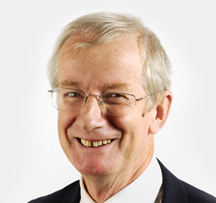Food Systems Podcast 20
In discussion with Allan Buckwell Podcast summary
Thursday, Apr 22, 2021
Can the CAP help tackle the climate emergency?
Among other goals, the European Common Agricultural Policy (CAP) is intended to support the EU Farm to Fork strategy and Green Deal. Emeritus Professor Allan Buckwell, Research Director at the RISE Foundation, sees many hurdles ahead. In our recent Food Systems Podcast, he discusses with host Robert de Graeff where European policy goes from here. If you don’t have time for the full podcast, take a few minutes to read our precis below of some of the highlights of their conversation.
You’ve said the CAP is stuck in an outmoded model. Why is that?
Pillar one, which still contains most of the support of the CAP, was there as compensation for reducing support prices and should have been transitory. We’ve muddled seriously the purpose of the payments and we remain in that muddled, inconclusive state.
In the next reform, the CAP is also meant to be the financial bridge between Farm to Fork, the Green Deal, and European farmers. Can it deliver?
It’s intended to. It’s unfortunate that Farm to Fork, Green Deal and various other strategies are coming up now. They weren’t in evidence in the previous Commission in which the current reform proposals emerged. The CAP could be re-tuned to embrace to goals of the Green Deal – if there was the will to do it. What we’re observing is that the will doesn’t seem to be there, not among farm ministers.
So, should the whole CAP be scrapped?
Logically, yes. There are some good ideas in there, but they simply don’t match to the ambitions and the seriousness of the climate and environmental emergency. And it’s taken us four years to get where we are. It simply doesn’t reflect the ambitions of the Commission. And it’s not clear that those ambitions are wholeheartedly and enthusiastically supported at high political level across the member states.
How many reform cycles can we say will ‘do’, before the structural problems overwhelm the system as it exists?
If we’re serious, grappling climate change in the 20s, 30s and 40s is essential. After that we run into catastrophic climate change and it’s too late. Farmers are aware that climate change can harm their own practical and business interests. The trouble is, at the political level in farming circles, they don’t see the problem. We haven’t elevated these issues to the priority they should be.
One of the big targets coming up is a significant reduction in the use of pesticide products. Is this realistic?
For every new mode of action and every new synthetic product you develop, sooner or later a resistant strain will emerge. We’ve got to find some other approaches such as biological control and ways of farming that are simply les intensive. I think it’s reasonable for the Green Deal to give a hefty push to finding other ways to control pests and diseases.
Can you give us one idea or policy that would change things to create a more sustainable food system?
We have to change the decision process. The policy now is so dominated by farmer interests. And they’re negotiated by ministers of agriculture who see themselves as defending one interest rather than looking at the food, nutrition, environmental and climate needs of their societies and by an agricultural committee in parliament who are self-selected with a very specific interest.
If you have found this short summary interesting, there’s lots more to hear in the full 26-minute conversation. It is available now on iTunes, Podbean or Spotify or on this website.

Allan Buckwell
Emeritus Professor Allan Buckwell is the Director of RISE's study of Nutrient Recycling and Reuse in European Agriculture and...see more
